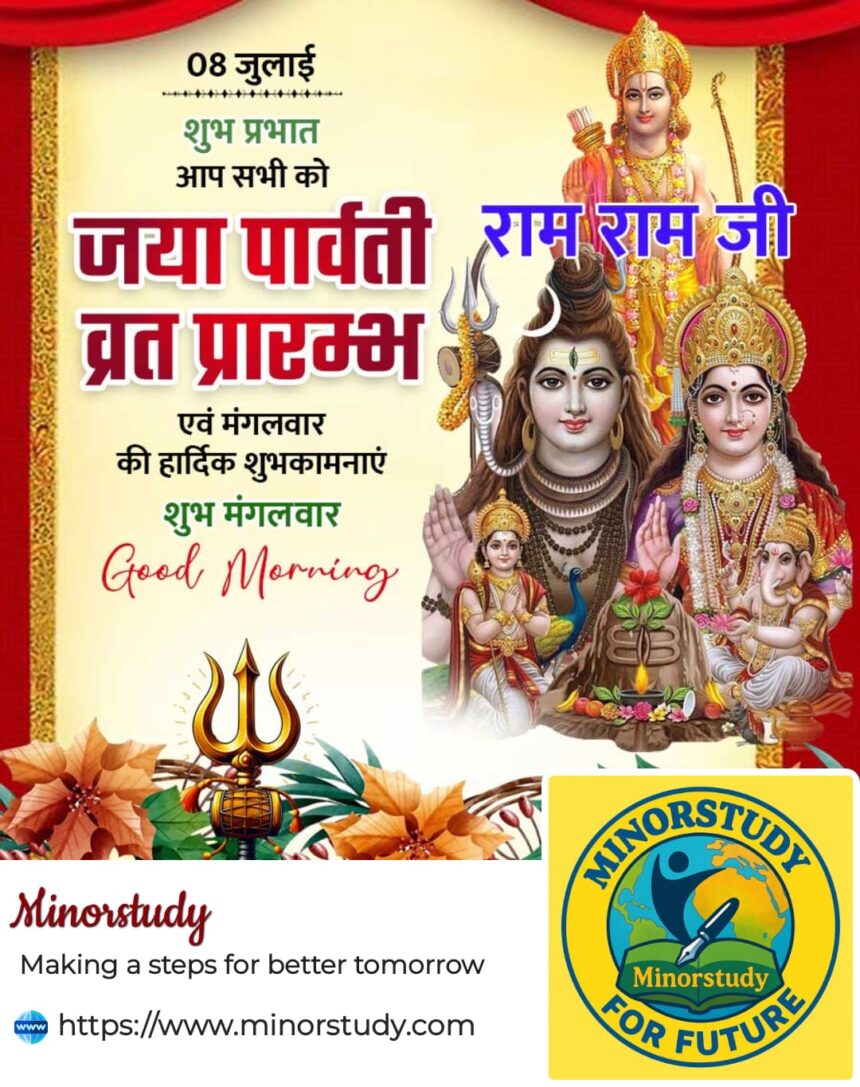🌸 7 Auspicious Blessings of Jaya Parvati Vrat – A Powerful Journey of Faith and Hope
Jaya Parvati Vrat: In the sacred rhythm of Sanatan Dharma, certain observances transcend time and touch the deepest parts of the human soul. One such cherished vrat (fast) is the Jaya Parvati Vrat, a 5-day devotional observance primarily followed by unmarried women, especially in Gujarat and Maharashtra, to seek the blessings of Lord Shiva and Goddess Parvati for an ideal life partner.
- 📜 History of Jaya Parvati Vrat: A Devotee’s Unshakable Faith
- 📅 Timeline of Jaya Parvati Vrat
- 🌼 Rituals & Observances of Jaya Parvati Vrat
- 🌱 1. Sowing of “Javaara” (Sacred Grains)
- 🛑 2. Strict Dietary Observance
- 🧘♀️ 3. Daily Worship
- 🌙 4. Jagran (Night Vigil)
- 🍽️ 5. Vrat Udyapan
- 🕉️ Significance of Jaya Parvati Vrat
- 📚 7 Amazing Facts About Jaya Parvati Vrat
- 1️⃣ It mirrors Goddess Parvati’s tapasya
- 2️⃣ No salt for 5 days symbolizes control over desires
- 3️⃣ It is mostly observed by Gujarati women
- 4️⃣ “Javaara” is a metaphor for spiritual and personal growth
- 5️⃣ The last night vigil represents inner awakening
- 6️⃣ Vrat ends with gratitude and sharing
- 7️⃣ It creates a spiritual sisterhood
- ❓ Popular FAQs about Jaya Parvati Vrat
- Q1. Who can observe Jaya Parvati Vrat?
- Q2. What can be eaten during the vrat?
- Q3. Can men also observe this vrat?
- Q4. What is the importance of sowing seeds?
- Q5. What should be done with the javaara after the vrat?
- 💖 Beautiful Wishing Message for Jaya Parvati Vrat
- 🔎 Important Points to Remember
- 🌍 Societal Importance
- 🧠 Daily Life Impact
- 🪔 Conclusion: The Inner Meaning of the Jaya Parvati Fast
But the spiritual impact of this vrat goes beyond matchmaking. It celebrates devotion, discipline, purity of thought, and the divine feminine. Let’s explore its history, facts, rituals, timeline, significance, and the human essence behind it in more than 1200+ words, just like a sacred story told with warmth and wisdom.
📜 History of Jaya Parvati Vrat: A Devotee’s Unshakable Faith
The legend of the Jaya Parvati Vrat finds its roots in a deeply touching tale of a devotee’s unwavering faith in Lord Shiva.
According to traditional scriptures and oral lore:
Once, a pious Brahmin couple who had no children lived with great devotion to Lord Shiva.
They performed Jaya Parvati Vrat, seeking divine blessings.
The woman dreamt of Lord Shiva and was guided to offer prayers at a Shivalinga buried in the forest.
She followed this divine message, found the Shivling, worshipped it, and miraculously conceived a son.
From then on, this vrat came to be observed especially by unmarried women for a suitable husband, and married women for the well-being of their family.
This is not just a tale—it is a story of faith, fertility, womanhood, and divine love.
📅 Timeline of Jaya Parvati Vrat
| Event | Date (2025) | Details |
|---|---|---|
| Start of Vrat | July 8, 2025 (Tuesday) | Begins on Ashadha Shukla Trayodashi |
| Duration | 5 Days | Observed with strict rules |
| End of Vrat | July 12, 2025 (Saturday) | Concludes with night-long jagran |
| Vrat Udyapan (End Puja) | July 13, 2025 (Sunday) | Done with ceremonial feasting & donation |
🌼 Rituals & Observances of Jaya Parvati Vrat
The rituals are simple yet deeply symbolic, with each one reflecting devotion, balance, and feminine energy.
🌱 1. Sowing of “Javaara” (Sacred Grains)
On the first day, wheat or barley seeds are sown in a clay pot and watered daily.
This symbolizes growth, fertility, and new beginnings.
🛑 2. Strict Dietary Observance
Women avoid salt, spices, tomatoes, and oily foods.
Only simple satvik food is allowed—usually wheat rotis, milk, fruits, etc.
🧘♀️ 3. Daily Worship
Devotees offer sindoor, flowers, raw rice, haldi, kumkum, and chant Shiva-Parvati mantras.
🌙 4. Jagran (Night Vigil)
On the last night, a night-long vigil is observed with bhajans, kirtan, and fasting.
🍽️ 5. Vrat Udyapan
On the sixth day, the vrat ends with puja, feasting, and giving donations to the needy.
🕉️ Significance of Jaya Parvati Vrat
The power of this vrat lies in its spiritual simplicity and feminine strength.
Unmarried girls pray for an ideal life partner—just as Parvati did to marry Shiva.
Married women seek harmony, prosperity, and longevity of their husbands.
It is also a symbol of emotional discipline, where fasting is practiced not as punishment, but as a form of mindful living.
The vrat is not about control—it’s about grace, choice, and faith.
📚 7 Amazing Facts About Jaya Parvati Vrat
1️⃣ It mirrors Goddess Parvati’s tapasya
This vrat is inspired by her penance to attain Lord Shiva as her consort.
2️⃣ No salt for 5 days symbolizes control over desires
Salt is associated with taste, cravings, and ego—its absence signifies humility.
3️⃣ It is mostly observed by Gujarati women
But it is now becoming popular across India due to its universal values.
4️⃣ “Javaara” is a metaphor for spiritual and personal growth
As the seeds grow over 5 days, so does one’s faith and character.
5️⃣ The last night vigil represents inner awakening
Staying awake spiritually symbolizes alertness of the soul.
6️⃣ Vrat ends with gratitude and sharing
Giving food to the poor or Brahmins shows charity as a virtue.
7️⃣ It creates a spiritual sisterhood
Groups of women celebrate together, sing bhajans, and support each other.
❓ Popular FAQs about Jaya Parvati Vrat
Q1. Who can observe Jaya Parvati Vrat?
Unmarried girls, married women, and even young girls from any background can observe it.
Q2. What can be eaten during the vrat?
Only satvik food without salt or spice, such as wheat, milk, fruits, jaggery, and ghee.
Q3. Can men also observe this vrat?
Traditionally, it’s for women, but any devotee of Shiva-Parvati can spiritually connect through the observance.
Q4. What is the importance of sowing seeds?
They represent nurturing life—just like Parvati nurtured her dream of uniting with Shiva.
Q5. What should be done with the javaara after the vrat?
They are usually immersed in a holy river or offered under a sacred tree.
💖 Beautiful Wishing Message for Jaya Parvati Vrat
“May Goddess Parvati bless you with a heart full of love, a life full of grace, and a partner full of virtues. Happy Jaya Parvati Vrat! May your prayers bloom like javaara in divine sunlight.”
🔎 Important Points to Remember
Starts on Ashadh Shukla Trayodashi, lasts 5 days.
No salt or spicy food is allowed.
Daily puja with water, rice, flowers, and Shiva-Parvati bhajans.
Night vigil on the 5th day symbolizes awakening and divine grace.
Udyapan should be done with offering and gratitude.
🌍 Societal Importance
Strengthens women’s role in spiritual practices.
Teaches the value of discipline, devotion, and shared culture.
Helps preserve ancient folk traditions in a modern world.
Empowers young women with the spiritual strength of Parvati Mata.
🧠 Daily Life Impact
| Aspect | Life Impact of Jaya Parvati Vrat |
|---|---|
| Health & Discipline | Fasting improves digestion and mental clarity |
| Emotional Growth | Builds inner patience and resilience |
| Relationship Insights | Teaches respect and divine connection in love |
| Cultural Awareness | Connects youth to roots of Sanatan Dharma |
| Social Unity | Creates community among women across regions |
🪔 Conclusion: The Inner Meaning of the Jaya Parvati Fast
The Jaya Parvati Vrat is not merely a religious obligation. It is a celebration of feminine willpower, divine longing, and spiritual evolution. It shows how Goddess Parvati’s patient penance led her to become Shakti—the energy of the universe.
Whether you’re seeking a soulmate, or simply wishing to connect with your inner strength, this vrat teaches you:
“Don’t chase—become. Don’t wait—pray. Don’t fear—surrender.”








